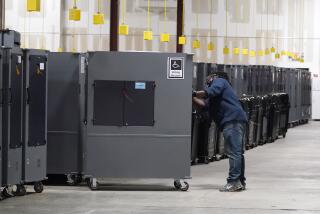Marcos Indicted for Racketeering : U.S. Says Ex-Philippine Leader, Wife Diverted Millions of Dollars
NEW YORK — A federal grand jury Friday indicted former Philippine President Ferdinand E. Marcos and his wife, Imelda, on charges that they diverted Philippine government funds to buy millions of dollars’ worth of New York real estate in a massive racketeering scheme of fraud, embezzlement, bribery and obstruction of justice.
A 79-page indictment charged the Marcoses, Saudi Arabian financier Adnan Khashoggi, seven other individuals and Los Angeles-based California Overseas Bank. It outlined an elaborate plot involving bribes, kickbacks, gratuities, secret bank accounts in Switzerland, Hong Kong and elsewhere, and falsified documents designed to thwart investigators and defraud U.S. financial institutions.
Ordered to Surrender
The Marcoses were ordered to surrender to federal authorities in New York by Oct. 31 or face arrest by FBI agents. Rudolph W. Giuliani, the U.S. attorney whose office directed the two-year investigation that resulted in the indictment, acknowledged the political sensitivity of the case but declared, “No one is above the law.”
James Fox, assistant director in charge of the FBI’s New York office, which conducted the probe, said the case “amounted to the Marcoses and the other defendants using their positions of trust to turn the Philippines treasury into their personal treasure.”
At a news conference in Honolulu, attorney Richard A. Hibey said the Marcoses will surrender to authorities for arraignment. However, Hibey denounced the allegations as false and said, “We look forward to the privilege of defending against the charges in a court of law.”
The indictment of Marcos, the highest-ranking former foreign official ever to face criminal charges in the United States, has been the subject of difficult internal Reagan Administration negotiations for months. Officials have been concerned about the precedent of bringing charges against a former leader of an allied state who was persuaded by American officials to relinquish power in the face of mounting internal opposition and flee to the United States.
The issue has been particularly troublesome for President Reagan, who provided Marcos with a haven in Honolulu when he fled Manila in February, 1986. Reagan was “saddened . . . because he (Marcos) is an old friend and a friend of the country,” White House spokesman Marlin Fitzwater said Friday in Bowling Green, Ky., where the President was campaigning for Republican candidates.
Fitzwater, attempting to emphasize that Marcos has been charged primarily with acts he committed since coming to the United States, added: “If he had behaved since he got here, he wouldn’t be in this position.”
Extraordinary Relationship
Illustrating the extraordinary relationship between the Marcoses and the White House, the former Philippine leader wrote an 11th-hour letter to Reagan in an attempt to head off prosecution, and a prominent woman who is an acquaintance of Nancy Reagan and Imelda Marcos tried unsuccessfully to plead Mrs. Marcos’ case to the First Lady, The Times learned.
Reagan’s rejection of Marcos’ appeal was hand-delivered to him in Honolulu on Thursday night, attorney Hibey said.
In Honolulu, Marcos and his wife remained cloistered inside their compound in the hills overlooking Waikiki beach with other family members, including their daughter, Irene, of the San Francisco suburb of Woodside, who flew to Hawaii to be with her father.
A spokesman for the family, Arturo Aruiza, said Marcos took the news of the indictment with relative calm. His wife, however, “is a little upset, but she’s been expecting this.”
The Philippine government in Manila welcomed Friday’s news, saying in a statement, “Given the pattern of corruption and abuse that marked the 20-year Marcos regime in the Philippines, we are not surprised at this indictment.”
Among the wide range of allegedly illegal activities involving Marcos and his associates, the voluminous indictment accuses what it calls the “co-racketeers” of purchasing Manhattan real estate with fraudulently obtained funds and then illegally hiding that ownership with phony legal documents.
In addition, it charges the Marcoses and others with filing false statements with federally regulated U.S. banks and with U.S. courts investigating conflicting ownership claims over the property.
Central to the alleged property fraud, investigators said, was California Overseas Bank, which the indictment said is owned and controlled by Marcos and bank chairman Roberto S. Benedicto, who was described by sources as Marcos’ longtime business associate and closest friend. Benedicto and former bank president Rodolfo T. Arambulo also were indicted, as was the bank itself, on racketeering charges.
Khashoggi, another of those named in the indictment, is an internationally known middleman who acted as a front for Marcos to help divert assets and conceal Marcos’ ownership of real estate and valuable art, according to the government.
In one alleged scheme, real estate documents supposedly were backdated in 1986 to make it appear that Khashoggi had bought New York office buildings in 1984, before the Philippine uprising and a court-ordered freeze on the Marcoses’ holdings.
Security Pacific National Bank said it made loans totaling $135 million on three buildings in Manhattan, which the indictment cited as Marcos-owned but said it does not “anticipate any loss whatsoever” on those loans.
Loans Fully Secured
A spokesman at the bank’s Los Angeles headquarters said that the buildings are currently appraised at “well over $200 million” and that the bank loans are fully secured. The loans were made to corporations “with no known ties to the Marcos family” between November, 1983, and February, 1985, the spokesman said.
The indictment said Security Pacific and Citibank of New York were defrauded on a total of more than $165 million in loans to Marcos properties. Purchase of one of the buildings, the Crown Building at 730 5th Ave., was listed as the first of the alleged racketeering acts in the indictment.
A spokesman for Citibank said only, “We haven’t seen the indictment and wouldn’t be able to comment.”
Also among those indicted Friday were Bienvenido Tantoco Sr., former Philippine ambassador to the Vatican and a Marcos business associate; Gliceria R. Tantoco, the former ambassador’s wife and a confidante of Imelda Marcos and a fugitive from an earlier related indictment; Bienvenido (Rico) Tantoco Jr., the couple’s son; Karl Bock Peterson, a Khashoggi aide who represented the Saudi financier in the allegedly fraudulent real estate transactions, and Jaime Alberto Arias, a Panamanian lawyer linked to the allegations of fraudulent property transfers and backdated documents.
The Marcoses and some of their associates, including Khashoggi, also are accused of participating in a scheme to divert to their own use nearly $6 million in works of art purchased with Philippine government funds.
None of the accused were taken into custody immediately, but federal authorities said their arrests will be sought at various points around the world.
U.S. Attorney Giuliani, flanked by prosecutors Charles LaBella and Debra Livingston, who directed the probe, said the investigation is continuing, in an apparent reference to allegations that U.S. foreign aid money may have been diverted to the private use of Marcos and his associates.
He refused, however, to answer questions about plea negotiations that were conducted until Thursday night.
At his news conference outside the green gates of the Marcos home in Honolulu, attorney Hibey said a plea bargain offer made earlier by U.S. government attorneys was “insulting.” He said that, contrary to published reports, it was not the Marcoses’ unwillingness to negotiate a plea bargain that precipitated the indictment.
“This was not a plea bargain that was presented,” he said. “It was a set of non-negotiable demands, a drop-dead deal, if you will.”
Hibey said government officials did not offer to waive prison terms. Under the U.S. proposal, he said, Marcos, 71, and his wife, Imelda, 59, would have pleaded guilty to a charge of racketeering, which carries a maximum sentence of 20 years in prison.
The agreement would also have required that the Marcoses forfeit their financial holdings and testify against co-defendants in the case, which would possibly include relatives, he said.
Hibey said he countered with an offer for a three-way settlement among the Marcoses, the U.S. government and the Philippine government, which has filed 39 civil suits against Marcos seeking to collect $96.17 billion. The State and Justice Departments would have been intermediaries.
Marcos previously has offered to return $5 billion to the Philippine government if it would allow him to return to his home there, but that offer was rejected.
“The question of settlement was flatly rejected,” he said.
Ronald J. Ostrow reported from Washington and William C. Rempel from New York. Staff writers Ron Harris in Honolulu, Al Delugach in Los Angeles, Dan Morain in San Francisco and Lee May, traveling with President Reagan, contributed to this story.
More to Read
Sign up for Essential California
The most important California stories and recommendations in your inbox every morning.
You may occasionally receive promotional content from the Los Angeles Times.










